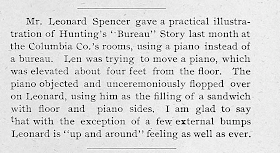Benjamin Robertson Harney in 1911
often called the "Inventor of Ragtime"
Frederick E. Hylands in 1912
early Ragtimer and earliest recorded ragtime pianist on records, starting in 1897
Ben Harney was called the "Inventor of ragtime" when Ragtime was at its height of popularity, as he was one of the first to introduce this new type of music to the stage in 1895. But when Harney became involved with Tony Pastor's famous vaudeville circuit in 1896, another face came his way, Mike Bernard:
Bernard reportedly learned how to play these syncopated melodies from Harney. But it wasn't just Bernard that Harney encountered. Fred Hylands took control of the pit in 1897 when Bernard was not present. The small stringy Bernard must have been surprised at the imposing figure Hylands was, same thing for Ben Harney.
Harney must have taken quite a curiosity for Hylands, as Harney was a very small, slim and fit Ragtime dancer, singer, and pianist(as you can see from the picture of him above), and Hylands was a rather tall(not really 6 feet tall though), weighed about 250 pounds, and had unusually dainty hands for his body type(again, revert to the picture of Hylands above to see my point).Harney must have thought of Hylands' presence on the new Ragtime scene as a challenge, as Hylands was a hardcore Indiana Ragtimer who certainly knew his way around a "Rag", even when he was drunk!
Hylands could still play a Rag very hearty when he was drunk, or exhausted, but that's only because when he was drunk, he became heavingly anxious to play Ragtime and just piano in general, even if his playing wasn't the best, he wouldn't notice it. But everyone else would!
Harney's place was taken for the time being at Tony Pastor's theatre, until Columbia dragged Hylands into their studio the next year, 1897. Hylands still sustained this position at the theatre while he was Columbia's "Complaining Pianist"(i.e. the snippet from The Phonoscope below):
Some of Columbia's staff probably called him their "Complaining pianist" from this little thing. This also says that they really worked the shit out of him, as this wasn't the only thing hinting at this in The Phonoscope.
Ben Harney's popularity did not seem to fade after 1900, as many of those beloved singers we know recorded many of Harney's famous songs, trying to imitate the supposed early "crooner's" singing style.
In my opinion, whether I get arguments or not, Rag-Time really began in 1896, and it started with Ben Harney, Fred Hylands and many early Ragtimers I cannot seem to list at the moment.
Harney and Hylands were the kings of early Ragtime.
I hope you all enjoyed this!




%2B2.jpg)





.png)
.jpg)
%2B(1).png)







